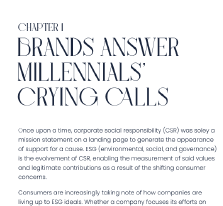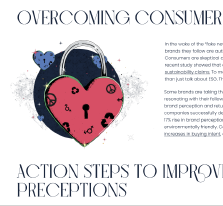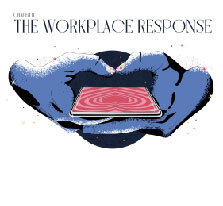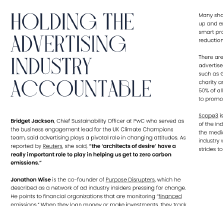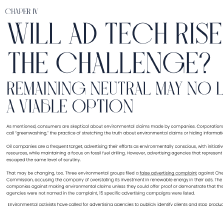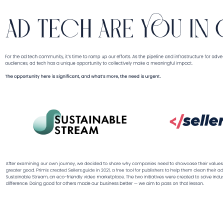CHAPTER 1
BRANDS ANSWER MILLENNIALS’ CRYING CALLS
Once upon a time, corporate social responsibility (CSR) was solely a mission statement on a landing page to generate the appearance of support for a cause. ESG (environmental, social, and governance) is the evolvement of CSR, enabling the measurement of said values and legitimate contributions as a result of the shifting consumer concerns.
Consumers are increasingly taking note of how companies are living up to ESG ideals. Whether a company focuses its efforts on emissions and renewable energy or on workplace diversity, communicating company values matters – and so does measuring them.
ESG does not just discuss a company’s stance on an issue, but the measures they are taking to partake in it. For example, how is a company addressing workplace diversity and inclusion? How is fair trade dealt with? How are these decisions and actions being enforced to reflect these principles?
For companies to have a positive influence on their environment, CSR must be genuine and be embedded in the companies’ culture and operations. Advertising campaigns are increasingly highlighting CSR and ESG to showcase company values and adapt to the changing consumer attitudes.
.png)
CONSUMER PRIORITIES ARE CHANGING. ARE BRANDS ADAPTINGS?
A PwC survey reported that 83% of consumers think companies should actively deploy ESG best practices; 86% of employees agree with this sentiment. Additionally, 62% of job seekers say they are more likely to seek employment with companies that are publicly committed to improving diversity and inclusion. At the same time, nine out of 10 business leaders believe their company has a responsibility to support ESG issues.
Consumers believe companies should be doing more to support...
Environmental
Social
Governance
This has forced companies to be more transparent about their practices — whether they want to be or not. Consumers, employees, and investors are choosing to align themselves with companies that share their values. Millennials in particular have been cited as spearheading this shift due to their spending power and ability to widely publicize their support or dissatisfaction.
CONSUMERS DEMAND TRANSPARENCY
76% of people say they pay attention to these issues and that they are willing to discontinue associating with brands and companies that treat the environment, communities, or their employees poorly.
Consumers are outspoken about these issues as well. 57% of consumers say companies should be doing more to advance environmental causes such as climate change. Nearly half of consumers want organizations to progress on societal issues as well, such as actively incorporating and enforcing diversity and inclusion (D&I) policies and being more transparent regarding privacy related issues.
76%
of consumers are more likely to purchase from a company that supports social issues
*Source: PwC's "Beyond compliance"
CHAPTER 1
BRANDS ANSWER MILLENNIALS’ CRYING CALLS
Once upon a time, corporate social responsibility (CSR) was solely a mission statement on a landing page to generate the appearance of support for a cause. ESG (environmental, social, and governance) is the evolvement of CSR, enabling the measurement of said values and legitimate contributions as a result of the shifting consumer concerns.
Consumers are increasingly taking note of how companies are living up to ESG ideals. Whether a company focuses its efforts on emissions and renewable energy or on workplace diversity, communicating company values matters – and so does measuring them.
ESG does not just discuss a company’s stance on an issue, but the measures they are taking to partake in it. For example, how is a company addressing workplace diversity and inclusion? How is fair trade dealt with? How are these decisions and actions being enforced to reflect these principles?
For companies to have a positive influence on their environment, CSR must be genuine and be embedded in the companies’ culture and operations. Advertising campaigns are increasingly highlighting CSR and ESG to showcase company values and adapt to the changing consumer attitudes.
-1.png?width=647&height=762&name=gulot%201%20(2)-1.png)
CONSUMER PRIORITIES ARE CHANGING. ARE BRANDS ADAPTINGS?
A PwC survey reported that 83% of consumers think companies should actively deploy ESG best practices; 86% of employees agree with this sentiment. Additionally, 62% of job seekers say they are more likely to seek employment with companies that are publicly committed to improving diversity and inclusion. At the same time, nine out of 10 business leaders believe their company has a responsibility to support ESG issues.
Consumers believe companies should be doing more to support...
Environmental
Social
Governance
This has forced companies to be more transparent about their practices — whether they want to be or not. Consumers, employees, and investors are choosing to align themselves with companies that share their values. Millennials in particular have been cited as spearheading this shift due to their spending power and ability to widely publicize their support or dissatisfaction.
CONSUMERS DEMAND TRANSPARENCY
76% of people say they pay attention to these issues and that they are willing to discontinue associating with brands and companies that treat the environment, communities, or their employees poorly.
Consumers are outspoken about these issues as well. 57% of consumers say companies should be doing more to advance environmental causes such as climate change. Nearly half of consumers want organizations to progress on societal issues as well, such as actively incorporating and enforcing diversity and inclusion (D&I) policies and being more transparent regarding privacy related issues.
76%
of consumers are more likely to purchase from a company that supports social issues
*Source: PwC's "Beyond compliance"
.svg)
.svg)
.jpg)
